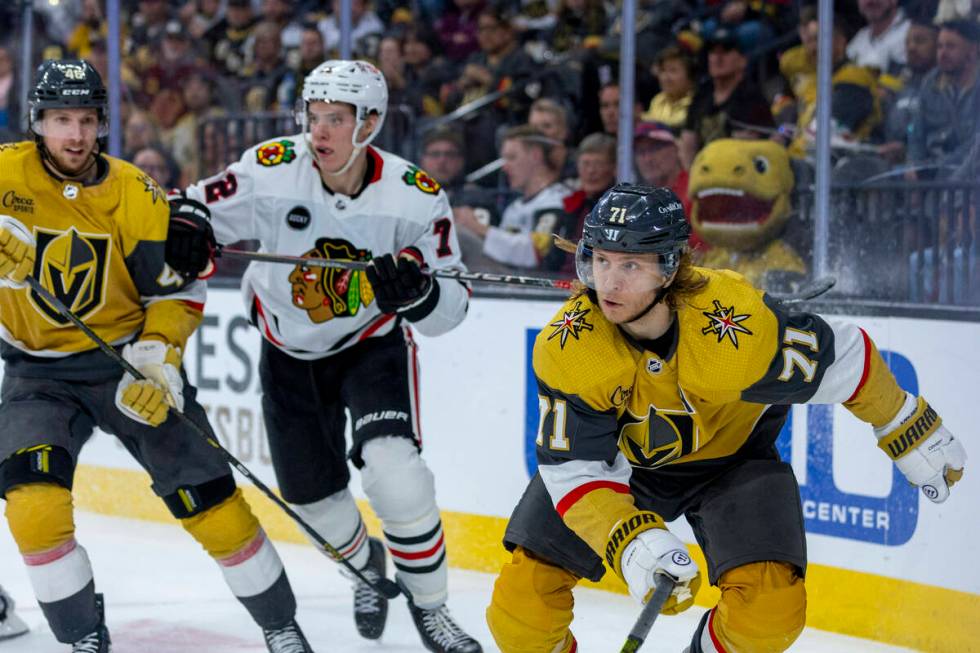‘A good year’: Karlsson showcased elite 2-way play for Knights

Ask Bruce Cassidy about William Karlsson and the same word comes up often.
“Cerebral,” the Golden Knights’ coach will say about his two-way center.
It’s using critical thinking and mental effort rather than feeling. You’ll never see Karlsson express his anger — although his career-high 22 penalty minutes this season ruled him out of any Lady Byng Trophy conversation.
The quiet demeanor has reverted back into a stealthy confidence.
Karlsson recorded his first 60-point season since the memorable 43-goal campaign in 2018. After four down years of lower point totals and frustrating injuries, Karlsson stormed back these past two seasons under Cassidy with 53 and 60 points, respectively.
He also hit the 30-goal mark for the first time since that inaugural season.
“It was a good year,” Karlsson said. “My shot felt good. It’s always good to contribute.”
Durability was never a question for the 31-year-old. He missed two games from 2016-19 until his first major injury, an upper-body ailment, caused him to miss nine games in 2020.
Karlsson was held to 74 points in two seasons before Cassidy replaced Pete DeBoer in June 2022. Not only has Karlsson turned the corner with his scoring, but he’s reminded the league why he’s an elite two-way center.
Selke candidate
Faceoffs weren’t a strong suit early. Karlsson won less than 50 percent of his draws in his first two years with the Knights, but has been above the cutline since. That number climbed from 51 percent to 56.2 percent in the past two seasons.
Karlsson was relied on defensively more than any other Knights center. The puck was in the defensive zone 39 percent of the time while Karlsson was on the ice this season, ranking in the 79th percentile in the league and tops among all Knights centermen.
He received one first-place vote for the Selke Trophy, given to the league’s best defensive forward. Florida Panthers captain Aleksander Barkov won the award for a second time this season.
The scoring touch showed signs of life last postseason, with Karlsson scoring 11 goals during the Knights’ run to the Stanley Cup, good for second on the team.
“The playoffs was good for me, scoring a lot of goals and contributing to the team,” he said.
Not to mention, this all happened as a third-line center.
Cassidy hoped the third line would turn into a shutdown line. It’s why Karlsson’s line is on the ice against some of the league’s best, whether it’s Edmonton’s top line with Connor McDavid or Colorado’s with Nathan MacKinnon.
It’s turning that defense into offense that has flipped the switch. Karlsson’s 17.1 shooting percentage was tops on the Knights this season and his best since a 14.2 percent clip in 2019.
“He’s always been a consistent 200-foot player,” Cassidy said. “I think last year, maybe the offensive part from the previous season wasn’t there, for whatever reason. Sometimes you have years like that and you lose a little bit of your confidence.
“The only thing I encourage him to do is shoot. I think he’s got as good a wrist shot as anybody in the league. He’s not a one-time guy or has a big slapper, but his release is excellent. It’s accurate. That part has come for him, and I think it’s confidence breeds more confidence.”
Frustrating postseason
The Knights kept their heads above water when Karlsson missed 12 games with a lower-body injury following the Winter Classic in Seattle, going 7-4-1. But when he wasn’t at 100 percent, notably in the first round against the Dallas Stars, it was evident.
A hamstring injury limited Karlsson to two points in the seven-game loss to the Stars. The injury was a specific reason why Cassidy couldn’t piece together the right line combinations and preserve a 2-0 series lead. Center Tomas Hertl skated with Karlsson on the third line in games to take faceoffs instead of Karlsson.
After taking 22 combined faceoffs in Games 1 and 2, Karlsson took 17 in Games 3-7.
In a low-scoring series that saw the cumulative score finish 16-16, having Karlsson at full health would have helped.
“My hamstring wasn’t chilling,” Karlsson said. “I feel like it affected my skating a little bit.”
Cassidy knows something about elite two-way centers. He coached Patrice Bergeron, the six-time Selke Trophy winner, while he was in Boston.
Bergeron was a 50- to 70-point player for most of his 19-year career before retiring at the end of the 2023 season. It doesn’t take a big point total to show it can be done. There is just a class of players – Barkov, in particular — that can lay claim to that title.
Steam may be brewing for Karlsson to soon be back in that camp.
“He’s one of the most underrated players in the NHL,” center Jack Eichel said, “and he doesn’t get enough attention for what he does.”
Contact Danny Webster at dwebster@reviewjournal.com. Follow @DannyWebster21 on X.